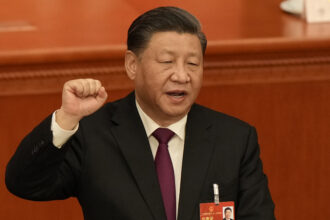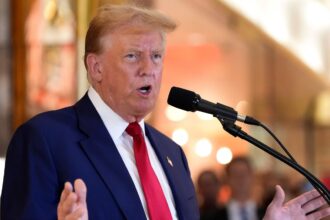President-elect Donald Trump has issued bold threats targeting Mexico, Canada, and China, vowing to impose heavy tariffs unless they address issues he claims contribute to America’s border and drug crises.
In a series of posts on Truth Social, Trump promised a 25% tariff on goods from Mexico and Canada, demanding immediate action against illegal immigration and drug trafficking. He argued that both countries have “the absolute right and power” to stop what he described as an “invasion” of the U.S. through its borders. The tariffs, he declared, would remain in place until the “flow of drugs and illegal aliens” ceased entirely.
Trump also expressed frustration with China, threatening an additional 10% tariff on Chinese imports. According to Trump, Chinese officials had failed to implement their maximum penalty—execution—for drug dealers as previously promised during discussions about fentanyl trafficking.
Trump Targets Mexico and Canada Over Border Policies
Trump’s threat of a 25% tariff is his latest escalation against neighboring countries. He has long accused Mexico of facilitating the passage of migrants from Central America, particularly from Guatemala, Honduras, and El Salvador, to the U.S. border. Trump’s proposed tariff aims to pressure the Mexican government into taking responsibility for the movement of migrants.
Canada was also included in the rhetoric, as Trump criticized both nations for what he called “ridiculous open borders.” He stressed that this was not just a U.S. issue but one requiring action from all parties involved.
China’s Role in the Drug Crisis
In his follow-up post, Trump turned his attention to China, blaming the country for its alleged failure to curb fentanyl production and trafficking. The synthetic opioid, primarily smuggled through Mexico, has been a focus of U.S. drug policy. Trump stated that his prior discussions with Chinese representatives about imposing the death penalty on drug dealers yielded no results. This perceived inaction, he argued, warrants stricter economic penalties.
“Drugs are pouring into our country at levels never seen before,” Trump wrote, emphasizing the need for immediate action from all countries involved.
Building on Old Rhetoric
Trump’s latest remarks build on his previous demands for Mexico to fund a border wall between the two countries. While the wall remains incomplete, Trump appears to be shifting blame more broadly to include Canada and China in his critique of global immigration and drug trafficking. His threats reflect a continuation of his nationalist policies, aiming to pressure foreign governments into aligning with his vision for U.S. security and trade.
Potential Global Fallout
If implemented, these tariffs could have significant implications for international trade. Canadian, Mexican, and Chinese imports play critical roles in the U.S. economy. A 25% tariff could disrupt supply chains, raise consumer prices, and strain diplomatic relations. For South Africa, this development could affect trade indirectly, as U.S. markets adjust to changes in pricing and product availability.
Trump’s fiery rhetoric is characteristic of his approach to foreign policy—one that prioritizes economic leverage to achieve security objectives. Whether these threats will materialize into concrete policies remains uncertain, but their potential impact is already sparking concern across borders.











